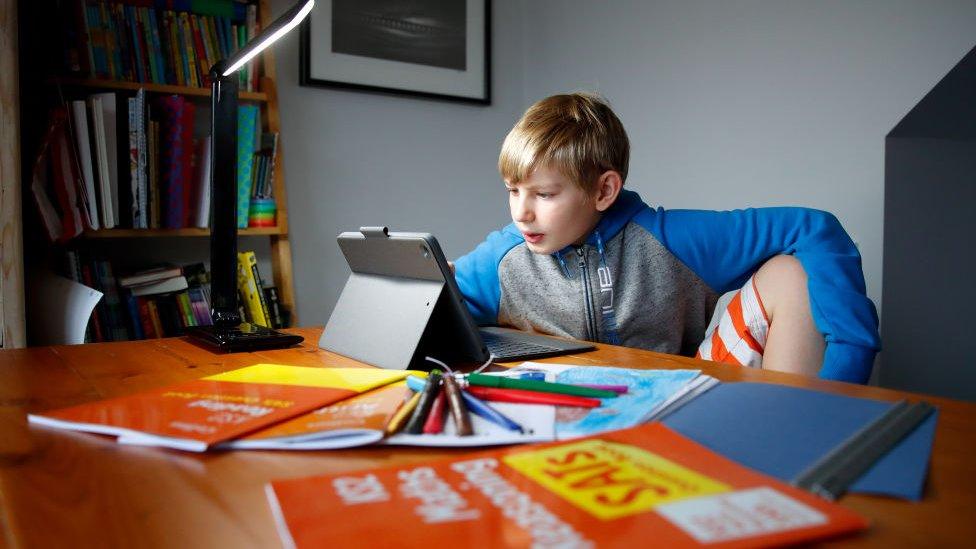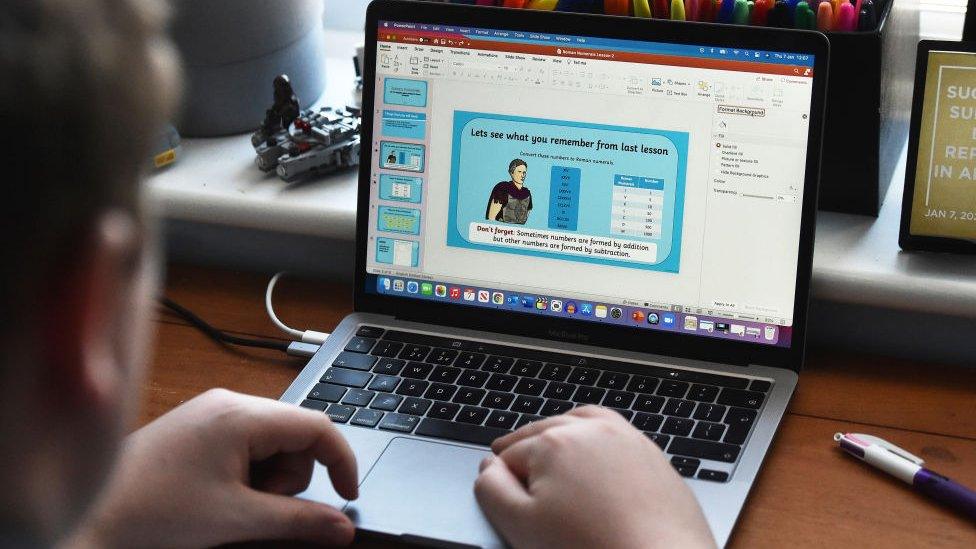Safer Internet Day: Research reveals the challenges of fake news
- Published
- comments

New research has suggested that almost half of all young people view fake and misleading information online every day.
The UK Safer Internet Centre (UKSIC) has found almost half (48%) of young people are seeing misleading content every day, with more than one in 10 seeing it over six times a day.
The team behind the study say this misinformation often leaves children "feeling annoyed, upset, angry, attacked or scared".
The findings have been released ahead of Safer Internet Day on 9 February - the day is all about giving young people the skills to support one another and offering advice for a safe and enjoyable online experience.
Over three quarters (77%) of young people say being online is a more important part of their life than ever before.
Over 65% are enjoying online lessons during lockdown.
Almost half (43%) of young people have noticed their friends sharing fake news online.
62% have had friend requests from people they don't know.
Being online has become an even bigger part of everyone's lives over the last year because of the coronavirus pandemic. School lessons have gone online and social distancing means there's been a lot more video calling and virtual meet-ups with friends and family.
Over three quarters (77%) of young people stated that being online is a more important part of their life than ever before.
Around two thirds (over 65%) said they were enjoying online lessons during lockdown while schools are shut.
The internet has allowed me to do everything that I would normally have done prior to the pandemic and even more, which I think is pretty cool!

More than three quarters of young people said that being online is a more important part of their life than ever
Misleading content is defined as content that is: "inaccurate, unreliable or not true, which can cause confusion or manipulate and influence people."
The theme of this year's Safer Internet Day campaign is to explore the internet's reliability in an online world. But sometimes trusting what you see on the internet can be easier said than done.
UKSIC's research said that fake news and inaccurate content came up often when they spoke with young people about the types of content they see online.
The study showed that of the 48% who witnessed false information on a daily basis, many of them described similarities in the things that they were exposed to.
One young person said: "I see a lot of fake news content and a lot of fake celebrity gossip." Another described how they saw "people on TikTok making up news and conspiracy theories".
Other misleading articles children spotted included "adverts on web pages showing celebrities with extreme weight loss transformations and stuff like that".
UKSIC says by highlighting the issues, it wants to give young people the skills to support one another, and learn the strategies to spot and speak out against harmful and misleading content online.

'This year in the UK we are putting the focus on how young people can tell fact from fiction, and work together to create an internet we trust' - UKSIC
Question, evaluate and reflect on the online content you see. If something seems odd, do more research.
Use other websites or books to fact-check information, or speak to your parent or a teacher.
Don't share your personal information or chat to strangers. Check with a parent/guardian if you are ever unsure.
Treat others with respect online. If you see anything that worries or upsets you, use the block and report buttons to take positive action to stop it and tell an adult.
List the apps and websites you know that feature reliable information. If you are ever unsure about something then ask an adult that you trust for some help and advice.
How to have a safe and positive time online
Navigating your way around the internet safely is a complex task and we are all constantly making decisions about who and what to trust online and how to stay safe.
The internet is an important tool to learn and study and to interact. Those behind Safer Internet Day hope it gives young people the chance to build the skills they need to be able to make the best decisions as they navigate an online world where everything might not always be what it seems.
Five ways to stay safe online.
It is the responsibility of all of us to report damaging, misleading or false information online when we see it but not many of us actually do.
Of the young people surveyed in this report, whilst 59% understood they should report inaccurate online content, 22% said they were more likely to block it compared to those (16%) who would report it.
Three letters that can help to keep you safe online
- Published24 September 2020

- Published5 May 2020

- Published10 February 2020

- Published24 November 2020

